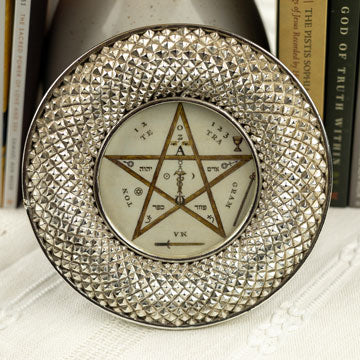About Our Incense
"Incense and perfume burn delightfully in all Hindu, Parsi, Jain, Shinto temples, etc. Incense and perfumes were never absent from the temples of Greece, Rome, Persia, etc." - Samael Aun Weor, The Perfect Matrimony
In all religious and mystical traditions, aromatic substances have been utilized as offerings to the gods, and as an aid for spiritual seekers.
"I sent forth to the four winds, I poured out a libation
I made an offering on the peak of the mountain:
Seven and seven I set incense-vases there,
Into their depths I poured cane, cedar, and scented wood.
The gods smelled a savour,
The gods smelled a sweet savour..." - The Chaldean Ut-napištim"And he burnt sweet incense thereon; as the LORD commanded Moses." - Exodus 40
"Who and what are the thimroth? They are angelic beings who are present in the incense of burnt offerings and are therefore called thimroth aschan (columns of smoke) and are thus helpers to man in his worship." - The Zohar
"The goddess said, "We, too, are touched by honour; we delight in festivals and altars; we heavenly beings are a greedy gang. Often by sinning has a man disposed the gods against him, and a sacrificial victim has been a sop for crimes. Often have I seen Jupiter, when he was just about to launch his thunderbolts, hold his hand on the receipt of incense." - Ovid, Fasti
Aromas have special properties, and there is a vast science describing their use. Most significant is the power of aromas in relation to the mind and consciousness; have you ever observed the power of aroma in reviving long-forgotten memories? That same ability can be utilized spiritually, to stimulate consciousness and heal psychic wounds. Moreover, aromatic substances create an atmosphere in which spiritual work is more effective, by both banishing harmful influences and attracting helpful ones. This is why in the Gnostic tradition, we use incense every day.
"The devotee must purify his bedroom daily with the smoke of special aromatic substances. Incense purifies the astral body. A good incense attracts the great masters whom we need for our work." —Samael Aun Weor, The Perfect Matrimony
"Proper incense is a barrier to the approach of entities and elementals from the underworld." —M, Lord God of Truth Within
There are hundreds of aromatic substances traditionally used for spiritual purposes. Generally, they are derived from plants. Leaves and sticks are usually dried and ground, while oils, gums, and liquids are purified and condensed. When used, incense is usually burned on hot charcoals or rolled into "sticks" with binding agents (such as in Indian incense, cow dung). In some cases, the entire plant can be dried and burned, such as sage, rue, or juniper.
Quality
Just as your body is most nourished by the freshest, cleanest food, so will your psyche be most benefited by the purest, best quality incense.
In these times of fast food and ultra-efficient production methods, incense has suffered the same decline in quality as most other products. It is very easy to find the cheapest, poorest quality incense, while the truly pure and effective incense is usually hard to get and costly. Nonetheless, incense is only as effective as its level of quality.
Determining what incense is pure and worth purchasing is not easy, but a key factor is the price. In most cases, you get what you pay for. A cheaply priced incense is usually worthless. The manufacturers of cheap incense almost always claim high quality but reveal nothing about their ingredients or production methods. In the end, your nose will know the difference. Poor quality incense can be identified by scents that are too strong, poorly blended, with a confusing or mixed smell, or are too smoky. Sometimes they do not smell like anything at all, because they have gone stale.
Incense is commonly sold in stick or cone form, yet these types are almost always the poorest quality available. There are hundreds of brands of stick incense, and most are mass produced in factories in India or China, without much care for purity, cleanliness, or quality. If you prefer Indian or Chinese scents, be aware that many of the most popular or well-known brands are also the worst quality.
Among Japanese and Korean manufacturers, it is much easier to find high quality incense. It appears that these traditions truly value their incense. However, they are also willing to pay a premium for them. It is common to see small boxes of stick-form incense selling for five times the cost Indian or Chinese brands. (There are brands of incense that cost $800 for a box of 30 sticks.)
A high quality incense can easily be recognized by the effect is has on you. Even smelling the box of a really good incense can bring a smile to your face. This is a good sign.
The best incense is made from natural ingredients like resin, flowers and leaves, thus freshness is important. You should use it while it is fresh, before the potency and scent diminish. Resin incense can last longer than incense sticks, but it still has a limited shelf life. (Cheap incense uses chemicals, oils, and synthetic substances to retain a potent scent for a long time; you may want to consider whether you want to breathe in those substances).
A good quality, pure incense is worth more than the money you pay to get it. The psychological and spiritual impact of good incense cannot be overstated. High quality incense can revive your spirits, inspire your practice, energize your heart and soul, and bring you a smile. Such effects are priceless. In short, do not bother buying cheap incense. Do yourself some good: get the best incense you can find.
The Gnostic Store endeavors to provide a range of incense for your taste and budget, and whenever possible we get incense from the maker, not only to ensure quality but also to get you the best price.
In some cases, you can prepare your own incense. Sage, rue, and other plants are easy to grow, and have powerful aromatic effects.
How to Use Incense
Stick or cone incense can simply be lit and placed on the appropriate vessel; there are many types of incense burners for this purpose, or you can use a small vessel filled with sand, stones, or rice.
Gums, oils, and powders are best used with charcoal and a brazier. This ancient method is very easy and effective. In every case, use caution and be safe. Be alert to ensuring that whatever you burn is kept far from flammable materials.
It is also possible to use aromatics without burning them (ie. essential oils). Diffusers and similar tools place the aromatics into the atmosphere using water. While the quality of the aromatics is generally higher than those found in most incense, so is the cost.
Purposes of Incense
Throughout our mystical and spiritual history, there are uncountable substances used for their aromatic effects. Yet, for our purposes today, the most pressing needs can be addressed with just a few types of incense.
In general, we use incense for these primary purposes:
Cleaning
Your home, bedroom, or temple will gradually accumulated impurities that you bring in from outside or generate from harmful psychological habits. Certain types of incense are excellent for removing noxious elements from your environment, especially sulfur, benzoin, copal, asafetida, sage, juniper, and rue.
Perfuming
Once your environment is clean and prepared, a perfuming incense can be used to attract beneficial forces and to stimulate your psyche towards positive action. Some very effective perfuming aromas include frankincense, sandalwood, pine, cedar, rose, jasmine, and hundreds more.
Healing
Incense can radically aid our healing, whether from physical or psychic illnesses. In most cases, we start with the incense related to our zodiacal sign. Yet, beyond this, there are many special substances whose aromas have a special relationship with our mind. Frankincense is an excellent incense for healing.
Sick people must smell their zodiacal perfume on a daily basis:
- Aries: perfume of Myrrh
- Taurus: perfume like Costus root, an aromatic herb (costus is endangered, so try other aromatic herbs)
- Gemini: perfume of Mastic
- Cancer: perfume of Camphor
- Leo: perfume of Frankincense
- Virgo: perfume of White Sandalwood
- Libra: perfume of Galbanum
- Scorpio: perfume of Coral; some sources suggest Opoponax
- Sagittarius: perfume of Lignum Aloes (Aloeswood)
- Capricorn: perfume of Pine extract
- Aquarius: perfume of Spikenard
- Pisces: perfume of Thyme




